Star Trek: The Next Generation Sixth Season
Original air dates: September 1992 – June 1993
Executive Producers: Rick Berman & Michael Piller
Co-Executive Producer: Jeri Taylor
Captain’s Log: At this point, it was simply impossible to not take Star Trek: The Next Generation seriously. It was in its sixth season, and had even inspired a spinoff, as Star Trek: Deep Space Nine debuted in January 1993. Colm Meaney and Rosalind Chao took the O’Briens to the new show, and Sir Patrick Stewart and the Enterprise guest starred on the pilot episode “Emissary.” (Siddig el-Fadil and Station Deep Space 9 would return the favor in “Birthright, Part I.”)
In fact, the 1992/93 season began a sequence of years when Star Trek was at the height of a popularity that didn’t end until 1999: two shows on the air (TNG and DS9 from 1993-1994, DS9 and Voyager from 1995-1999) and a movie every two years (the first three TNG films were released in 1994, 1996, and 1998).
This season solidified one of the strongest writing staffs you’re ever likely to see, under the watchful eye of Jeri Taylor and Michael Piller (Piller was also involved in the creation of Deep Space Nine, and ran the writer’s room there, turning some of the reins over to Taylor for TNG), and it’s one that’s continued to be influential in genre television over the past twenty years, producing writers such as Ronald D. Moore, Rene Echevarria, Brannon Braga, and Naren Shankar.
The show stretched its creative muscles in this season as well, airing multiple mid-season two-parters for the first time with “Chain of Command” and “Birthright,” two of its strongest stories. They broke the formula a few times with a moody alien abduction story (“Schisms”), an action movie (“Starship Mine”), and an episode that was completely bugnuts crazy (“Frame of Mind”). And several of the actors got opportunities to stretch a bit: Jonathan Frakes became a complete wreck twice (“Schisms” and “Frame of Mind”), Sir Patrick Stewart was tortured (“Chain of Command, Part II”), Marina Sirtis got to role-play as a bitch on wheels (“Face of the Enemy”), Michael Dorn played Worf as a semi-messianic figure and then got to meet an actual messianic figure (“Birthright, Part II” and “Rightful Heir”), even Brent Spiner got to play seven different people on the holodeck (“A Fistful of Datas”).
Plus there was some serious character development, a lot of it in the form of looking into the characters’ pasts to help explicate the present: Guinan’s first meeting with Picard (“Time’s Arrow, Part II”), Picard’s youthful indiscretions (“Tapestry”), Riker and Troi’s past relationship and the ambitious young man Riker used to be (“Second Chances”), and Worf and Data both dealing with father issues of various sorts (“Birthright, Part I”). Plus Picard got to fall in love (“Lessons”), Worf got to influence Klingon politics yet again (“Rightful Heir”), and we found out why there are so many humanoid aliens (“The Chase”).
And, finally, they brought Scotty back in “Relics,” which was just cool.
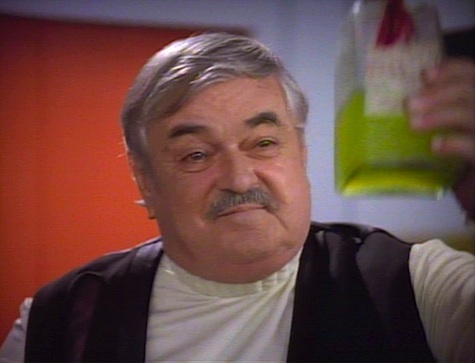
Highest-Rated Episode: No doubt my Klingon bias is showing but I really did think the two best episodes of the season were “Birthright, Part II” and “Rightful Heir,” which both scored a 10. Honorable mention to “Ship in a Bottle,” “Tapestry,” “Birthright, Part I,” “Lessons,” and “Frame of Mind,” which all earned a 9.
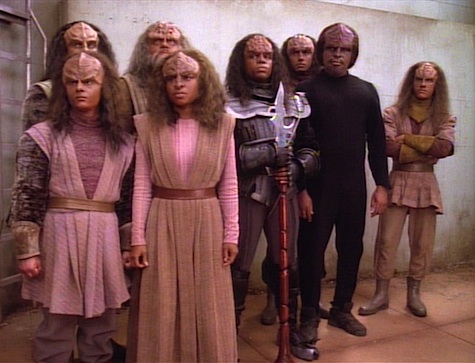
Lowest-Rated Episode: “Man of the People,” with a well-deserved 1.
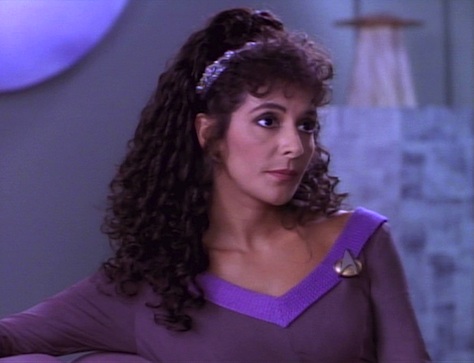
Most Comments (as of this writing): “Chain of Command, Part I” with 67. Jellico has been a topic of heated conversation among Trek fans for twenty years—why stop now?
Fewest Comments (as of this writing): With the caveat that it’s only been up for a couple of days, “Descent,” with a mere 16.
Favorite Can’t We Just Reverse the Polarity? From “The Chase”: Somehow, linking pictures of protein sequences can form a computer program that can alter a tricorder built billions of years after it was written. SCIENCE!
Favorite Thank You, Counselor Obvious: From “Tapestry”: When Lieutenant Picard goes to see Troi and Riker, and asks them for a frank assessment of his career, it’s a rhapsody in damning with faint praise, using words like, good, thorough, dedicated, reliable, and, after a bit of a struggle, punctual. When the lieutenant makes it clear that he has delusions of command, Troi gently slaps him down, pointing out that his career is an endless stream of lofty goals with no drive to achieve them.
Favorite What Happens On The Holodeck, Stays On The Holodeck: From “A Fistful of Datas”: Okay, seriously, why does the holodeck even have safeties that can be “disengaged”? Shouldn’t those safeties be hardwired?
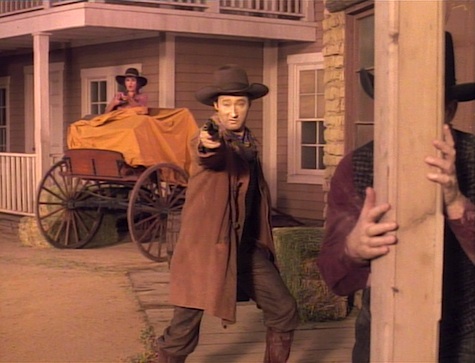
Favorite No Sex, Please, We’re Starfleet: From “Man of the People”: Having been refused by both Alkar and Riker, Troi has to settle for seducing Ensign Pretty Boy, who had the first officer walk in on their morning after. Yeah, his crew evaluation’s gonna look great.
Favorite If I Only Had a Brain… From “Relics”: Data serves as Scotty’s bartender, providing him with an actual alcoholic beverage as opposed to the standard-issue synthehol, to wit, the Aldebaran Whiskey, which he doesn’t recognize, and so must simply say to Scotty that “it is green.” (This is a callback to one of Scotty’s lines when he gets the Kelvan Tomar drunk in “By Any Other Name.”)
Favorite There is No Honor in Being Pummeled: From “A Fistful of Datas”: Worf is still the worst father ever, but he does go from actively working to avoid spending leisure time with his son to a willingness to someday in the future again spend leisure time with his son. So that’s progress.
Oh, and after they jail Eli, he hilariously queries Alexander about 19th century jurisprudence: “Is there a trial? Or shall I execute him?”
Favorite The Boy!?: From “Rascals”: When Troi is talking seriously about Picard going back to the Academy, Picard takes the piss out of her by adding, “And be Wesley Crusher’s roommate?”
Favorite Syntheholics Anonymous: From “Time’s Arrow, Part II”: Young Guinan manages to figure out a way to get into the mineshaft, because she’s just that awesome. (It’s not entirely clear how Clemens was able to get in, not once, but twice.) Meanwhile, Old Guinan is singularly unhelpful in guiding Riker, her silence enabling the artificial suspense of the climax. This is odd behavior, given how eager she was to influence the timelines in “Yesterday’s Enterprise.” (Of course, that was a “wrong” timeline, whatever that means…)
Favorite In the Driver’s Seat: From “Relics”: Ensign Rager returns, and she performs an incredibly nifty, and totally unappreciated, bit of piloting, as she flies the big, glunky Enterprise through a rapidly closing hatch at top speed. Seriously, that’s some amazing threading of a needle, and you kinda wish somebody had congratulated the poor woman on basically saving everyone’s ass.
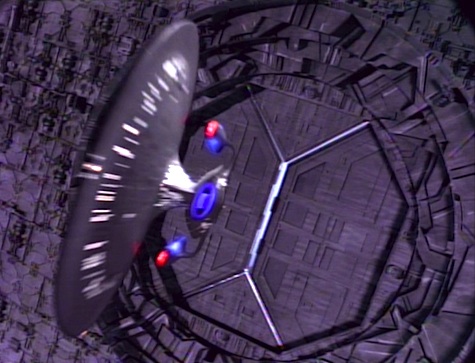
Favorite Welcome Aboard: It’s Guest Star Heaven in this season. Seriously. I mean, we start with James Doohan returning as Scotty in “Relics.”
Then we have Jerry Hardin as Samuel Clemens (“Time’s Arrow, Part II”), Olivia d’Abo as Amanda (“True Q”), John Pyper-Ferguson as Eli (“A Fistful of Datas”), Daniel Davis as Moriarty and Stephanie Beacham as Regina (“Ship in a Bottle”), Scott MacDonald as N’Vek, Barry Lynch as DeSeve, and Carolyn Seymour as Toreth (“Face of the Enemy”), Ned Vaughn as Zweller, J.C. Brandy as Batanides, and Clive Church as Maurice Picard (“Tapestry”), David Spielberg as Hutch and Patricia Tallman as Kiros (“Starship Mine”), Wendy Hughes as Nella Daren (“Lessons”), and Tricia O’Neil as Kurak and James Horan as Jo’Bril (“Suspicions”).
Lots of recurring guests, also: Colm Meaney (“Realm of Fear,” “Rascals”) and Rosalind Chao (“Rascals”) as the O’Briens before buggering off to Deep Space Nine. Plus we’ve got Dwight Schultz as Barclay (“Realm of Fear,” “Ship in a Bottle”), John deLancie as Q (“True Q,” “Tapestry”), Brian Bonsall as Alexander (“Rascals,” “A Fistful of Datas”), Lanei Chapman as Sariel Rager (“Relics,” “Schisms”), Ken Thorley as Mr. Mot (“Schisms”), Patti Yasutake as Ogawa (“Realm of Fear,” “Man of the People,” “Suspicions”), and Robert O’Reilly as Gowron (“Rightful Heir”).
We had a couple of scientists: Dr. Mae Jemison as Palmer (“Second Chances”) and Professor Stephen Hawking as himself (“Descent”).
Future Voyager stars showed up: Alexander “Vorik” Enberg as a reporter (“Time’s Arrow, Part II”) and Tim “Tuvok” Russ as Devor (“Starship Mine”).
There were two Robert Knepper moments: Reg E. Cathey as Morag (“Aquiel”) and Cristine Rose as Gi’ral (“Birthright, Part II”).
But what was most impressive was how many episodes had just an amazing roster of guest stars: “Rascals”: David Tristan Birkin, Isis J. Jones, Megan Parlen, and Caroline Junko King as the kid versions of Picard, Guinan, Ro, and Keiko. “Chain of Command” (both parts): Ronny Cox as Jellico, Natalia Nogulich as Nechayev, John Durbin as Lemec, and David Warner as Madred. “Birthright” (both parts): Siddig el-Fadil as Bashir, James Cromwell as Shrek, Alan Scarfe as Tokath, Richard Herd as L’Kor, and Rose. “The Chase”: Linda Thorson as Ocett, Norman Lloyd as Galen, John Cothran Jr. as Nu’Daq, and Salome Jens as the protohumnanoid. “Rightful Heir”: Kevin Conway as Kahless, Robert Oppenheimer as Koroth, and O’Reilly.
But probably the most impressive guest star was Brent Spiner, who not only played Data all season, but also did seven different holodeck characters (“A Fistful of Datas”), the image of Noonien Soong (“Birthright, Part I”), and Lore (“Descent”).
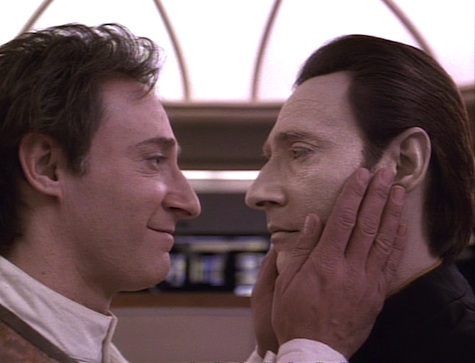
Favorite I Believe I Said That…: From “Schisms”: “Felis catus is your taxonomic nomenclature. / An endothermic quadruped, carnivorous by nature.”
The opening line to “Ode to Spot” by Data. It doesn’t actually get any better. (Riker gets to read the opening to same in “A Fistful of Datas.”)
Favorite Trivial Matter: A tie between one for “Time’s Arrow, Part II,” ’cause it was fun to research Samuel Clemens’s life and see how badly the episode botched it, and the one for “Relics,” where I got to show off all of the uses of Scotty in the 24th century in the tie-in fiction.
Make it So: Many people consider the third season to be the show’s strongest, but my default tends to be this one. This season has more or less the same crap-to-excellent ratio as the third, but where the third had the bad stuff mixed in here and there amidst the brilliance, most of the awfulness of this season was stuffed into the first nine episodes, which only had one standout (“Relics”), and only two others that are really in any way good (“Realm of Fear,” “True Q”).
After that, though, things kick into high gear starting with “Chain of Command,” a two-parter that is one of Trek’s most memorable, and continuing to an impressive run of sustained excellence for most of the rest of the season. There’s a great variety of storylines here, too, some designed to let the actors show off a bit more than usual (“Chain of Command, Part II,” “Face of the Enemy,” “Frame of Mind”), some to continue the ongoing storyline expanding on the Klingon culture and political landscape (“Birthright, Part II,” “Rightful Heir”), some simply to give characters a spotlight (“Starship Mine,” “Suspicions,” “Second Chances”), some to shake up the status quo a bit (“Chain of Command, Part I,” “Rascals”).
The show also showed a greater awareness of its own continuity that was refreshing, showing that these people have led lives that have affected them directly. Sometimes it’s as simple as a few references here and there (La Forge and Scotty discussing the events of “Galaxy’s Child” in “Relics,” picking up on Picard’s love of riding from “Pen Pals” in “Starship Mine,” Picard suggesting technobabble from “Time’s Arrow” in “Timescape”). Others are more like sequels, from “Ship in a Bottle” finally following up on “Elementary, Dear Data” to “Tapestry” fleshing out the story Picard told Wes in “Samaritan Snare” to “Lessons” picking up on the events of “The Inner Light” to “Rightful Heir” picking up on “Birthright, Part II” to “Descent,” which is a sequel to both “I, Borg” and “Brothers.”
Overall, just an impressive run of powerful, well-written, well-acted episodes, and can stand on its own as arguably TNG’s best season.
Warp factor rating for the season: 9
Keith R.A. DeCandido wishes everyone a wonderful holiday.










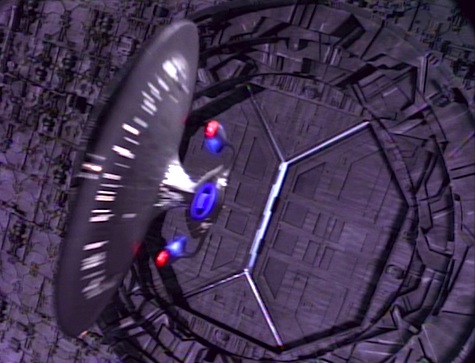
The show also showed a greater awareness of its own continuity that was refreshing, showing that these people have led lives that have affected them directly.
This is the one thing that I miss in a lot of episodic shows; as cool as it is to be able to sit down and watch a random episode and have it not really matter what happened before or after, I get the most enjoyment out of a show when it starts to build a universe that exists outside of the 44 minutes or so that I’m watching weekly. Tells me that the writers really care about the characters and generally, imho, makes for better writing because of it.
Looking forward to next season’s rewatch!
Yeah, I enjoyed this season too and one of my favorite things was that some of the episodes were just totally different. I really liked both Schisms and Frame of Mind just for the mood. Granted, I didn’t really like Fistful of Datas but that’s more because westerns aren’t really my thing.
Even though I tend to dislike holodeck adventures, I did really enjoy Ship in a Bottle, just because of the guest stars and Barclay.
However, the high point of the season is certainly Ode to Spot ;)
I actually would rate both Birthright part 2 and Rightful Heir way on the bottom, but I guess I’m just not that into Klingons, sorry :) Not sure what my very favorite one is though…
Also, really looking forward to the season 7 discussion as we’re about halfway through (next up: Sub Rosa which I am actually really looking forward to because I want to see if it’s as bad as everybody says!) and there is sooooo much I want to discuss/hear others’ opinions on. Like Data being a total psychopath. And mint frosting.
And my very knee jerk reaction to the prime directive and why it kind of horrifies me.
But we’ll get there :D
@2,3: I would also put Rightful Heir on the bottom. Also, I kind of agree that the PD is stupid, especially when it comes down to: “Let’s sit around and watch this planet full of people die.”
With mint frosting.
I definitely think your Klingon bias is showing, not that I mind because I share it ;) And while I agree with you about Birthright, I don’t think I have ever seen or heard anyone refer to “Rightful Heir” with such praise. I think it’s one of my least favorite Worf episodes on TNG.
That said, season 6 is my favorite of TNG. It was the first season of Star Trek that watched first-run, so that makes it special. And as you noted, overall it just had some awesome episodes.
I think the 6th and 7th seasons of the show were by far the best. The characters were fully developed by this point and the actors seemed to grow into their roles and act more believably.
I think the 6th season was in particular a defining season for Deanna.
For the first 5 seasons, she was constantly victimised by aliens of all stripes. She was telepathically raped, kidnapped, tortured with music playing in her mind, possessed by aliens, and even surgically altered. Yet she was always able to pull herself through and got past it. I think this made her realize that she was tougher and more resourceful than she believed, and she was promoted to Commander in the final season.
She is my favourite character on the show. (I like all of the main characters though)
I personally think this season ties with season 3 for the best season. “Tapestry”, “Frame of Mind”, “Ship in a Bottle” and “Birthright: Part I” (Sorry, that one’s all for Data and Bashere. I don’t have much of a Klingon bias, but I did like “Rightful Heir” and its exploration of faith.) These are some of the best episodes of the series.
That being said, I find it hard to place these episodes above such gems as “The Enemy”, and its great follow up “The Defector”, “The Offspring”, “Sins of the Father” (Which is still a great episode even without a Klingon bias (Favorite line goes to Picard with his response to Duras: “You may test that assumption at your convenience.” (Sorry about the nested parenthases.))) I also really enjoyed “The Ensigns of Command”, “Who Watches the Watchers”, and of course, the cliffhanger “The Best of Both Worlds: Part I”.
I was sitting here just reading this and thinking that this season and Season 3 were both pretty good, and then I read some of the comments. Once I did, I just had to comment. I agree with @3 and @@.-@. I am really looking forward to the mint frosting…
Will this whet people’s appetite (pun intended) for season 7?
http://www.geekychef.com/2012/04/cellular-peptide-cake-with-mint.html
I think the show simply got better and better as it went along. In fact, it was nominated for an Emmy for Best Dramatic Series in Season 7. Had the show not been cancelled in 1994, I think the 8th season would have been even better.
I watched the first season in reruns in 2010 and I think most of that season was so amateurish it almost seemed laughable.
And I didn’t really like the addition of Dr. Pulaski in Season 2 either. She didn’t seem to fit in and mesh with the rest of the crew and made the season less enjoyable.
Of course these are some of the best individual episodes, but I still prefer the third season because it had more of the groundbreaking exploring-the-unknown quality. It’s probably unavoidable when a series gets on in years. Notably very few of the episodes involve exploring the unknown (making it worse, the one that does the most and even puts some archaeology into it, The Chase, is awful). At best, individuals go on extended field trips, but it’s not the same as the ship heading off into the unknown or taking on unknown passengers. Also, I think the Enterprise as a ship (and being a ship) is incidental to the majority of these episodes, if that makes sense.
Was I the only one, at the end of Ship in a Bottle, who wished we could follow Moriarty and Regina, with their fresh sense of a galaxy awaiting them, instead of sliding back into the Enterprise character-in-peril routine? Granted, when character is done well it’s great and I’m not complaining about this rightfully highly rated season, but this is where the “Remember when we used to be explorers?” thing got out of hand.